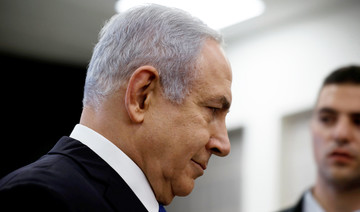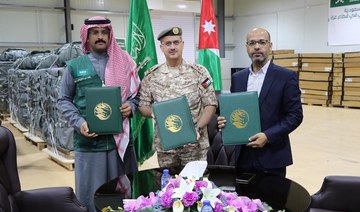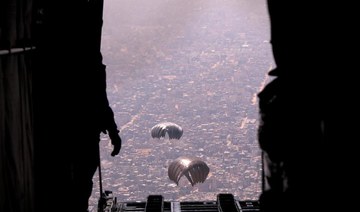JERUSALEM: Israeli Prime Minister Benjamin Netanyahu traveled to Moscow on Wednesday to meet with President Vladimir Putin and discuss military coordination amid new strikes in Syria blamed on Israel.
Together with Putin, Netanyahu toured a parade celebrating the anniversary of the World War II victory over the Nazis and then met the Russian president at the Kremlin for consultations. Netanyahu he said he was eager to discuss ways of “solving crises and removing threats in a thoughtful and responsible manner.”
After 10 hours together, Netanyahu said he conveyed Israel’s obligation to defend itself against Iranian aggression.
“I think that matters were presented in a direct and forthright manner, and this is important. These matters are very important to Israel’s security at all times and especially at this time,” he said.
Syrian state media said Israel struck a military outpost on Tuesday near the capital of Damascus. The Britain-based Syrian Observatory for Human Rights said the missiles targeted depots and rocket launchers that likely belonged to Iran’s elite Revolutionary Guard in Kisweh, killing at least 15 people, eight of them Iranians.
Tensions between Israel and Iran are high over Iran’s efforts to expand its military presence in Syria, where it is a key ally of President Bashar Assad. Repeated airstrikes attributed to Israel have killed Iranian fighters and prompted threats of reprisal from Tehran. President Donald Trump’s announcement Tuesday that the US would withdraw from the 2015 nuclear deal with Iran has triggered uncertainty and threatened to spark more unrest in the Middle East.
“The meetings between us are always important and this one is especially so,” Netanyahu said ahead of his departure. “In light of what is currently happening in Syria, it is necessary to ensure the continued coordination” between the two militaries. Netanyahu made no mention of the overnight strikes.
The Israeli and Russian militaries have been in contact throughout much of Russia’s intervention in Syria, where Moscow has waged an air campaign in support of Assad’s forces since 2015. Russia also considers Iran a strategic ally.
Israel views Iran as its archenemy, citing Iran’s calls for Israel’s destruction, support for militant groups across the region and growing military activity in neighboring Syria. Israel has warned that it will not allow Iran to establish a permanent military presence in Syria.
Israel’s military went on high alert Tuesday and bomb shelters were ordered open in the Israeli-controlled Golan Heights following reports of “irregular activity of Iranian forces in Syria.” After an uneventful night, the military on Wednesday called on residents to return to “full civilian routine,” meaning studies and excursions would continue as usual, although the shelters would remain open.
Israel, which almost never confirms or denies airstrikes in Syria, did not comment on Tuesday’s attack. Such strikes have become more frequent recently. The Syrian Observatory said the casualty number from Tuesday’s strike is likely to go up because of a large number of people who were wounded and a number of people who are missing.
Iran has vowed to retaliate to recent Israeli strikes in Syria targeting Iranian outposts, including an attack last month on Syria’s T4 air base in Homs province that killed seven Iranian military personnel. On April 30, Israel was said to have struck government outposts in northern Syria, killing more than a dozen pro-government fighters, many of them Iranians.
Amos Gilead, a retired senior Israeli defense official, told a security conference in the coastal town of Herzliya that Iran’s intentions in Syria meant a wider conflagration may only be a matter of time.
“They want to build a second Hezbollah-stan,” he said, referring to the Iranian-backed Lebanese Shiite militant group that last fought a war with Israel in 2006. “They are determined to do it and we are determined to prevent it. It means we are on a collision course.”
Netanyahu meets Putin amid new round of Syria strikes
Netanyahu meets Putin amid new round of Syria strikes

- Netanyahu viewed a parade celebrating the anniversary of the World War II victory over the Nazis and then met with the Russian president at the Kremlin for consultations.
- Tensions between Israel and Iran are high over Iran’s efforts to expand its military presence in Syria.
Israel warns of escalation from cross-border fire from Hezbollah

- Hezbollah says it will not halt fire unless Israel stops its military offensive on Gaza
JERUSALEM: Intensified cross-border fire from Lebanon’s Hezbollah movement into Israel could trigger serious escalation, the Israeli military said on Sunday.
“Hezbollah’s increasing aggression is bringing us to the brink of what could be a wider escalation, one that could have devastating consequences for Lebanon and the entire region,” Israeli military spokesperson Rear Admiral Daniel Hagari said in a video statement in English.
Iran-backed Hezbollah last week launched the largest volleys of rockets and drones yet in the eight months it has been exchanging fire with the Israeli military, in parallel with the Gaza war.
After the relatively heavy exchanges over the past week, Sunday saw a marked drop in Hezbollah fire, while the Israeli military said that it had carried out several air strikes against the group in southern Lebanon.
The US and France are working on a negotiated settlement to the hostilities along Lebanon’s southern border. Hezbollah says it will not halt fire unless Israel stops its military offensive on Gaza.
“Israel will take the necessary measures to protect its civilians — until security along our border with Lebanon is restored,” Hagari said.
‘No joy’: Gazans mark somber Eid in shadow of war

- Many Palestinians forced to spend holiday without their loved ones
- I hope the world will put pressure to end the war on us because we are truly dying, and our children are broken
GAZA STRIP: In tents in the stifling heat and bombed-out mosques, Gazans on Sunday marked the start of the Eid Al-Adha holiday, devoid of the usual cheer as the Israel-Hamas war raged on.
“There is no joy. We have been robbed of it,” said Malakiya Salman, a 57-year-old displaced woman now living in a tent in Khan Younis City in the southern Gaza Strip.
Gazans, like Muslims the world over, would usually slaughter sheep for the holiday — whose Arabic name means “feast of the sacrifice” — and share the meat with the needy.
Parents would also give their children new clothes and money for the celebration.
But this year, after more than eight months of a devastating Israeli campaign that has flattened much of Gaza, displaced most of the besieged territory’s 2.4 million people, and sparked repeated warnings of famine, the Eid is a day of misery for many.
“I hope the world will put pressure to end the war on us because we are truly dying, and our children are broken,” said Salman.
Her family was displaced from the far-southern city of Rafah, a recent focus of the fighting which began after Hamas’s Oct. 7 attack on southern Israel.
The military on Sunday morning announced a “tactical pause of military activity” around a Rafah-area route to facilitate the delivery of desperately needed humanitarian aid to Gazans.
AFP correspondents said there were no reports of strikes or shelling since dawn, though the Israeli military stressed there was “no cessation of hostilities in the southern Gaza Strip.”
The brief respite in fighting allowed worshippers a rare moment of calm on holiday.
Many gathered for the Eid Al-Adha morning prayer in the courtyard of Gaza City’s historic Omari Mosque, which was heavily damaged in Israeli bombardment, placing down their frayed prayer mats next to mounds of rubble.
The sound of prayers traveled down some of the city’s destroyed and abandoned streets.
“Since this morning, we’ve felt a sudden calm with no gunfire or bombings ... It’s strange,” said 30-year-old Haitham Al-Ghura from Gaza City.
He hoped the pause meant a permanent ceasefire was near, though truce mediation efforts have stalled for months.
In several areas of the war-battered territory, especially in Gaza City, young boys were seen manning roadside shops selling perfumes, lotions, and other items against the backdrop of piles of rubble from destroyed buildings and homes.
Many vendors used umbrellas to protect themselves from the scorching sun as they sold household items on Gaza City’s main market street. But there were few buyers.
Food and other goods can reach four or five times their usual price, but those who cling to the holiday traditions can still afford them.
In Khan Younis, displaced man Majdi Abdul Raouf spent 4,500 shekels ($1,200) — a small fortune for most Gazans — on a sheep to sacrifice.
“I was determined to buy it despite the high prices, to perform these rituals and bring some joy and happiness to the children in the displacement camp,” said the 60-year-old, who fled his home in Rafah.
“There is sadness, severe pain, and suffering, but I insisted on having a different kind of day.”
The deadliest-ever Gaza war began after Hamas’s unprecedented Oct. 7 attack.
Israel’s retaliatory offensive has killed at least 37,337 people in Gaza, also mostly civilians, according to the Health Ministry in the territory.
For many, a halt in fighting can never bring back what has been lost.
“We’ve lost many people, there’s a lot of destruction,” said Umm Mohammed Al-Katri from Jabalia refugee camp in northern Gaza.
“This Eid is completely different,” she said, with many Gazans forced to spend the holiday without their loved ones killed or displaced during the war.
Grieving families on Sunday flocked to cemeteries and other makeshift burial sites, where wooden planks marked the graves.
“I feel comfort here,” said Khalil Diab Essbiah at the cemetery where his two children are buried.
Even with the constant buzzing of Israeli drones overhead, visitors at the cemetery “can feel relieved of the genocide we are in and the death and destruction,” he said.
Hanaa Abu Jazar, 11, also displaced from Rafah to the tent city in Khan Yunis, said: “We see the (Israeli) occupation killing children, women and the elderly.”
“How can we celebrate?” asked the girl.
Jordan conducts three airdrops in southern Gaza

- Aid packages containing food, clothing, and sweets were delivered to various locations in the southern Gaza
AMMAN: Jordan’s armed forces conducted three airdrops to the southern part of Gaza on Sunday, in collaboration with Egypt, to mark the first day of Eid Al-Adha, Jordan News Agency reported.
Aid packages containing food, clothing, and sweets were delivered to various locations in the southern Gaza Strip by two planes from the Royal Jordanian Air Force and an aircraft from Egypt.
Earlier on Saturday, a 45-truck humanitarian aid convoy arrived in Gaza, sent by the JAF and the Jordan Hashemite Charity Organization (JHCO).
In cooperation with its regional and international allies, the Jordanian armed forces have carried out 261 airdrops and delivered 1,970 trucks of aid since the beginning of Israel’s onslaught on Gaza.
WHO chief Tedros Adhanom Ghebreyesus said that “a significant proportion of Gaza’s population is now facing catastrophic hunger and famine-like conditions,” as Israel continues to impose severe restrictions on the supply of food, water, medicine, and fuel to the Strip.
Kuwait Red Crescent distributes meat to Lebanese families, Syrian, Palestinian refugees

- Initiative follows last week's distribution of Eid Al-Adha packages by the KRCS
LONDON: The Kuwait Red Crescent Society (KRCS) has launched an initiative to distribute meat to around 1,500 Lebanese families, as well as Syrian and Palestinian refugees in Lebanon, in celebration of Eid Al-Adha, Kuwait News Agency reported on Sunday.
Youssef Boutros, relief coordinator of the Lebanese Red Cross (LRC), announced that the distribution process had begun on Sunday.
This initiative follows last week's distribution of Eid Al-Adha packages by the KRCS, which included clothes and other essentials for around 2,000 families, covering Lebanese families and Syrian and Palestinian refugees.
In addition to these efforts, the KRCS is continuing its humanitarian aid to 6,000 Lebanese families in southern Lebanon, who have been affected by military confrontations between Hezbollah and Israel since October.
This aid, which includes food and staple supplies, is being distributed with the assistance of the LRC.
ICC members demand end to ‘intimidation’ so court can carry out work

- Group of 93 states issues statement amid reports of Israeli activities against court
- Call is also in response to the behavior of other countries
LONDON: A group of 93 states has demanded the International Criminal Court be allowed to work “without intimidation” after reports that Israel has been engaged in a nine-year clandestine campaign to undermine it.
In a statement the group said it would work to preserve the court’s “integrity from any political interference and pressure,” amid claims by the office of the ICC’s chief prosecutor, Karim Khan, that it has received threats after he requested arrest warrants for senior Israeli government and Hamas figures, including Israel’s prime minister, Benjamin Netanyahu, and Defense Minister Yoav Gallant.
The statement in defense of the ICC, which called on “all states to ensure full cooperation with the court for it to carry out its important mandate,” was drafted by Belgium, Chile, Jordan, Senegal and Slovenia after “eye-opening” revelations about Israeli intelligence operations against the court published in The Guardian. It was also signed by Western states including Germany, France, Canada and the UK.
A diplomatic source told the paper that the story had “made some (diplomats) realise that it’s time to put out some sort of statement from the states that belong to the court, responding to what has now come to light.”
The source added that the statement was not just aimed at the actions of Israeli intelligence agencies but was also a response to the behavior of other states, including a cyberattack on the ICC last year that came during investigations into senior Russian figures accused of involvement or complicity in crimes committed in Ukraine.
The source told The Guardian: “The court is going after some very powerful people, not just in the Palestine investigation, and it’s time to send a message that the state parties are there to defend it.”
Danya Chaikel, the International Federation for Human Rights’ representative to the ICC, said: “This is a unique moment of international solidarity, with 93 ICC states parties standing up for global justice and accountability for mass atrocities. They are collectively opposing the egregious threats to the court from powerful countries including Israel, the US and Russia, and strongly rejecting their efforts to manipulate the rule of law for political gains.”





















